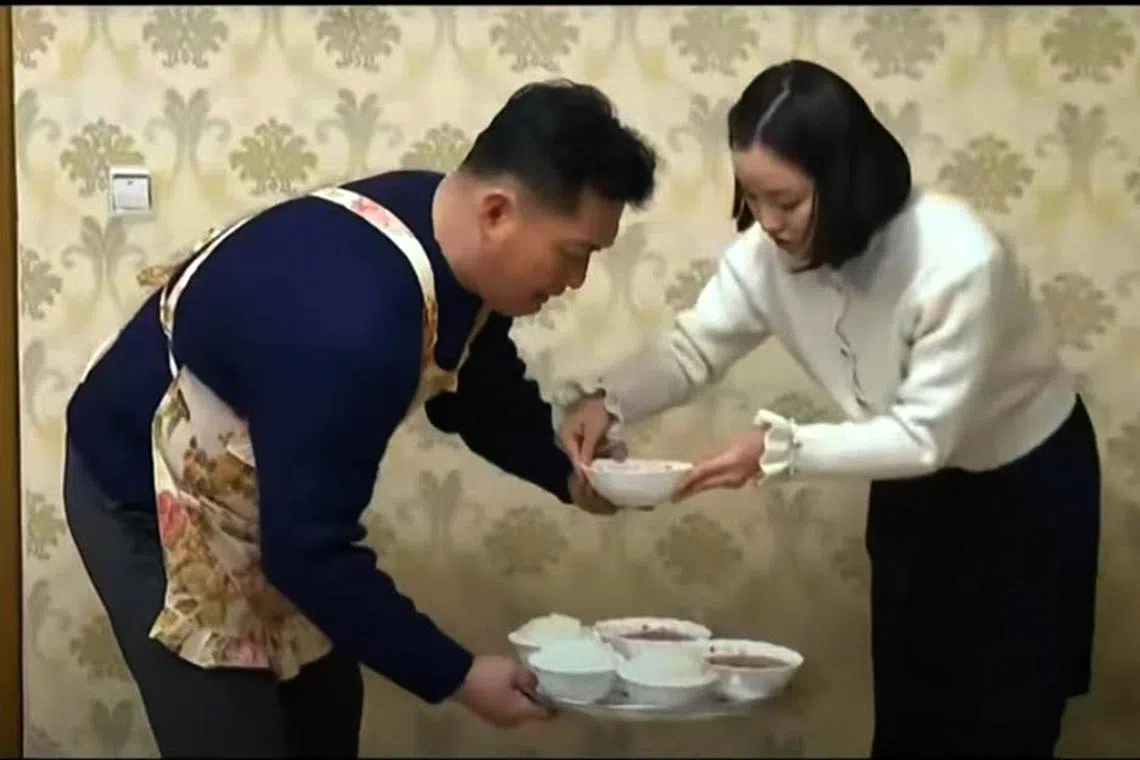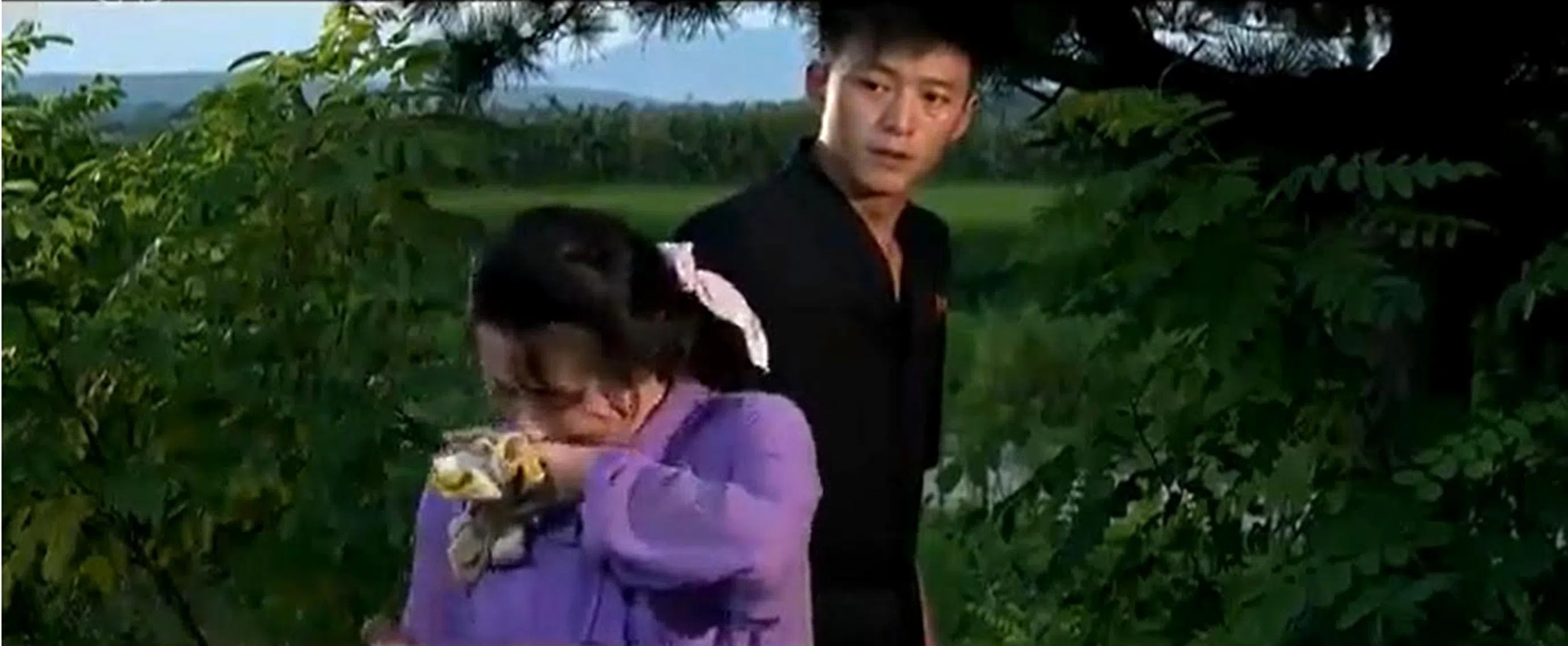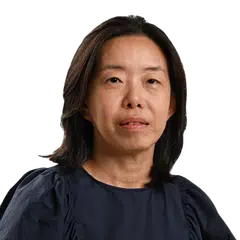From propaganda to passion: N. Korean TV show mimics K-drama to fend off banned media from the South
Sign up now: Get insights on Asia's fast-moving developments

For the first time, a North Korean drama features a romance subplot of young star-crossed lovers facing parental objections, a trope more commonly seen in South Korean dramas.
PHOTO: SCREENGRAB FROM KOREAN CENTRAL TV
- North Korea released "A New Spring In The Field Of Manchurian Cranes", a drama with South Korean tropes which signals changing social norms.
- The drama addresses corruption and modern farming, but still promotes the regime's directives, amid strict laws against South Korean media consumption.
- Despite changes, experts believe North Koreans will still watch banned South Korean dramas, while authorities learn new production techniques.
AI generated
SEOUL – A new North Korean television drama has drawn attention for its plot and characters that are more reminiscent of K-dramas produced in South Korea – a soft-power phenomenon that Pyongyang has been trying to curb within its shores.
Just like hit Netflix K-drama When Life Gives You Tangerines, which aired recently, the hermit kingdom’s latest drama, A New Spring In The Field Of Manchurian Cranes,
This marks a big shift in tone for North Korean TV dramas, which are usually heavy on propaganda and light on emotions; this cultural offering of the North even includes a romantic trope used in the dramas of the South.
It features a scene in which a man dons an apron and makes dinner for his family, signalling a change in social norms in North Korea, a society with deep patriarchal roots.
For this reason, the 22-episode drama series has reportedly created a buzz in North Korea after it aired from April 16 to June 24.
The July issue of Geumsu Gangsan
Dr Yee Ji-sun, a researcher at the Korea Institute for National Unification, told The Sunday Times that the marked shift in plot development, character behaviour, and dialogue from previous staid North Korean productions is likely an attempt to move towards offering more engaging content to North Korean viewers, to prevent them from consuming banned foreign media.
“The drama seems to have adopted a trendier drama style from the South that North Koreans may have become familiar with,” said Dr Yee. “Such a style would also be enjoyable and interesting even to those who have never watched a South Korean drama in their lives.”
North Korea, which has been closed off from most of the world for decades, maintains a tight fist on foreign media entering its shores, including productions from South Korea.
The drama – the first since a 2023 series about a North Korean prosecutor’s battle against hidden anti-party elements and traitors, titled A Prosecutor’s Note – comes amid Pyongyang’s crackdown on the consumption of South Korean entertainment in particular.
In December 2020, punishment for those caught watching or possessing South Korean entertainment was increased from a maximum of five years in hard labour camps, to a maximum of 15 years.
Those found guilty of distributing such materials may even face the death penalty.
North Korean law also prohibits its citizens from “speaking, writing or singing in South Korean style”, an offence punishable by up to two years of hard labour.

The first episode features a scene with a man donning an apron and making dinner for his family, signalling a change in social norms.
PHOTO: SCREENGRAB FROM KOREAN CENTRAL TV
In 2021, North Korean leader Kim Jong Un declared that K-pop was a “vicious cancer” spreading “anti-socialist influence” and “corrupting the attire, hairstyles, speeches, behaviour” of young North Koreans.
At a UN High Commissioner for Human Rights event in Seoul on June 25, North Korean defectors shared chilling testimonies of public executions of distributors of K-drama and K-pop materials, with as many as 12 people executed at one go. These were held twice every three months.
“A 22-year-old I knew was publicly executed for distributing three South Korean dramas and about 70 K-pop songs,” said Mr Kim Il-hyuk, who defected with his family in May 2023.
Dr Immanuel Kim, a specialist in North Korean literature and cinema at the George Washington University in the US, pointed out that the characters in the new drama are better dressed, with the men sporting more stylish haircuts than those in previous productions.
He also noted that most of the housing featured in the drama contains newer and more modern designs, likely a showcase of Mr Kim’s “New Era Rural Revolution” initiative launched in 2021.
The initiative aims to revitalise rural areas by improving agricultural productivity, building new housing and bridging the urban-rural divide.
Despite the switch-up in North Korea’s drama production, Dr Kim believes that North Koreans will still continue to watch banned South Korean dramas in secret.
“I think the authorities and filmmakers are also watching the dramas closely to learn new techniques and editing skills. While the messaging will not change for a very long time, the presentation of the dramas has changed and become more palatable to more modern and younger tastes,” he said.
Indeed, some of the lines in A New Spring In The Field Of Manchurian Cranes would not be out of place in a typical K-drama.
Set in a neglected and underdeveloped rural county, the story revolves around agricultural researcher Kyoung-mi, who helps the farming community adopt modern techniques to exceed grain production targets set by the capital.
In the process, she forms close ties with the community, and joins in their fight against corruption.

The new North Korean drama, A New Spring In The Field Of Manchurian Cranes, shows a marked shift away from the usual heavy propaganda.
PHOTO: SCREENGRAB FROM KOREAN CENTRAL TV
Kyoung-mi has been dating prosecutor Yeong-deok for four years, but the latter’s parents are against the romance.
In one scene, Yeong-deok’s mother is seen telling Kyoung-mi that marriage is not just about two people liking each other, and that it is “important to win over the hearts of the parents-in-law, too”, before beseeching Kyoung-mi to “be the one to walk away first”.
A show review in the Chosun Sinbo
Romance aside, Dr Yee told ST that, thematically, “the drama is still similar to conventional North Korean dramas in that the characters’ passionate labour aligns with the directives of the regime”.
The inclusion of the scene in which the apron-wearing man is cooking for his family also reflects the evolving perceptions of gender division of labour in North Korea, especially among younger people, noted Dr Yee.
Dr Lee Ae Ran, who defected from North Korea to the South in 1997 and is now an activist as well as a restaurateur, told ST that men helping out in the kitchen is not a new phenomenon in North Korea, but noted that this was the first time it has been shown on TV.
She said: “For it to appear in a drama, that is probably something done intentionally as a message, knowing that it will be seen outside of North Korea, too.”



